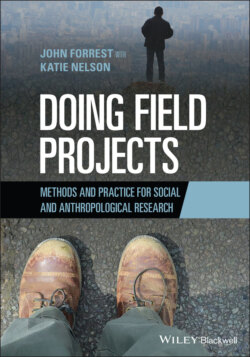Читать книгу Doing Field Projects - John Forrest - Страница 25
Keeping a Journal
ОглавлениеIf you are doing a number of these projects for some kind of course of study or training, I strongly advise you to keep a personal journal (in the spirit of Malinowski’s Diary). A journal has several functions. The projects themselves have a built-in self-critical component, and this is an important part of each exercise. A journal has a somewhat different purpose, although self-critical analysis needs to be in there. It is crucial to realize that a journal is not a public document; it is your private space for ruminations. It is for your eyes only. You can note down anything in a journal that comes to your mind at the time – including what you had for lunch or if it was raining on the way to an interview. You should not spend much time thinking about what is and is not relevant as a journal entry. It is a written version of your inner monolog, so that anything and everything are relevant.
Reflexivity (pp 20–21) is not a necessary component of many of the projects in this book, but an assessment of your successes and failures each time is essential. Personal ruminations on how well you think you are doing, what things you can do differently, fears you have, and the like are part of the ongoing process of maturing as a fieldworker and should be recorded. The individual entries can serve as a guide concerning your personal motivations, for example, when you are writing up the results of each project, but the journal also has the long-term benefit of being a permanent record of your inner workings as a fieldworker, and can be consulted long after your training has finished.
